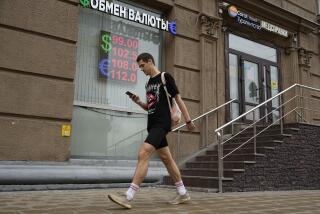Brazil’s Real at Record Low Against Dollar
- Share via
Mounting debt, political disarray and a disappointing delay in an International Monetary Fund cash infusion have helped push Brazil’s currency down an additional 5% this week to a record low against the dollar, adding to pessimism about the country emerging any time soon from its economic malaise.
The real closed Tuesday at 2.15 per dollar, after sinking as low as 2.23 earlier in the day, prompting Brazil’s central bank to intervene to prop up the value of its embattled currency.
That means the real has lost 44% of its value against the dollar since Jan. 13, when Brazil decided to let the currency float.
Brazilian bonds also plunged amid speculation the central bank may boost rates this week to curb inflation and shore up the currency. Brazil’s largest stock market index, the Bovespa, lost 1.38% to close at 9,070.
David Malpass of Bear, Stearns & Co. blamed a high demand for dollars as $5 billion in dollar-linked Brazilian public- and private-sector debt comes due for refinancing this month. Exorbitant interest rates of 40% are not enough to attract investors with dollars to buy and hold reals, Malpass said.
The result, according to James Upton of Credit Suisse First Boston, is a “lack of liquidity in dollars.”
The real was unaided by the good news this week that Brazil scored a trade surplus last month. Also, there is the apparently imminent approval by the Brazilian Senate of Arminio Fraga, a former George Soros associate, as new central bank head, an appointment cheered by the international investment community.
Attention has been turned instead to signs that another cash infusion from the IMF may not come until April, two months later than expected. The IMF will wait for Brazil’s Congress to pass more deficit-reduction legislation this month, before giving its next installment on the $41.5-billion rescue package agreed to in November, sources say.
The IMF handed over an initial $9.3 billion in November, but only after receiving promises of deep spending cuts that have yet to be legislated, said Gary Hufbauer, senior fellow at the Institute for International Economics in Washington. Brazil’s budget deficit will approach a horrific 9% of economic output this year, he said.
The IMF wants action on Brazil’s government deficit because it is a root cause of the loss of investor confidence, ensuing capital flight and the subsequent January devaluation.
“All this delay has added to the market anxiety and reduced investors’ appetite to extend dollars,” said Carlos Kawall, chief economist for Citibank’s Brazilian operations, based in Sao Paulo.
With $35 billion in foreign reserves, Brazil is in no short-term danger of running out of money. But as was shown last year, when it spent close to $50 billion over five months in a losing battle to prop up the real, that much money won’t last long when foreign capital heads for the exits.
Hufbauer said it is now likely that when the next batch of IMF funds does arrive, it will total as much as $16 billion, more than the $9.3 billion that has been talked about.
Among the measures expected to be voted upon this month by the Brazilian Congress are a financial transaction tax amounting to 0.38% on all checks and ATM withdrawals; social security reforms that would reduce the $9 billion in pension plan red ink; and deep cuts in federal payrolls, among the most bloated of any industrialized country.
But passage of the measures is less certain than just a few months ago. President Fernando Henrique Cardoso has suffered a severe erosion in political support since the January devaluation. His approval ratings are at a low point, and he faces a formidable challenge from state governors on the terms of debt owed by states to the federal government.
“My impression is that it’s not the economics but the political uncertainty,” said Sidney Weintraub of the Center for Strategic and International Studies in Washington.
More to Read
Sign up for Essential California
The most important California stories and recommendations in your inbox every morning.
You may occasionally receive promotional content from the Los Angeles Times.













